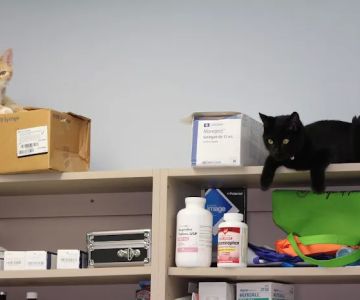What Can You Do with a Veterinary Degree? Exploring Career Opportunities in the Animal Health Field
- 1. Overview of a Veterinary Degree
- 2. Career Options with a Veterinary Degree
- 3. Working in Private Practice as a Veterinarian
- 4. Pursuing a Career in Research and Academia
- 5. Exploring Veterinary Specializations
- 6. Careers in Wildlife and Exotic Animal Care
- 7. Non-Clinical Careers for Veterinarians
- 8. Real-Life Experience: My Journey with a Veterinary Degree
1. Overview of a Veterinary Degree
Obtaining a veterinary degree is a significant achievement for anyone passionate about animals and healthcare. A veterinary degree equips you with the knowledge and skills necessary to diagnose, treat, and prevent illnesses in animals. As a veterinarian, you’ll be able to work with a wide variety of species, from household pets like dogs and cats to farm animals, exotic creatures, and even wildlife.
The road to earning a veterinary degree is long and challenging. It typically requires completing a bachelor's degree in a related field, followed by a veterinary school program that usually lasts four years. After graduation, aspiring veterinarians must pass rigorous licensing exams to practice. With a veterinary degree, you are prepared for a wide range of careers that involve animal care, research, and education.
This article will explore the various career options available to individuals with a veterinary degree. From clinical work to research and even non-clinical careers, the opportunities for those with a veterinary background are diverse and rewarding.
2. Career Options with a Veterinary Degree
With a veterinary degree, there are numerous career paths you can follow. Whether you prefer working directly with animals or contributing to the field through research or education, a veterinary degree opens up many doors. Here are some of the main career options available to veterinary graduates:
2.1 Clinical Veterinarian
One of the most common career paths for those with a veterinary degree is to work as a clinical veterinarian. In this role, you will diagnose, treat, and perform surgeries on animals. Clinical veterinarians can specialize in different areas, such as small animals, large animals, or exotic pets. It’s a rewarding career for those who enjoy working with animals directly, and it offers a high level of job satisfaction due to the ability to make a difference in the lives of animals and their owners.
2.2 Research and Education
If you’re interested in the science behind veterinary medicine, a career in research or education may be a good fit. Researchers in veterinary medicine work to discover new treatments and improve existing ones, while educators teach the next generation of veterinarians at universities and veterinary schools. Both career paths allow you to contribute to the advancement of veterinary science and healthcare for animals.
2.3 Public Health and Regulatory Careers
Veterinarians with a focus on public health play a crucial role in preventing zoonotic diseases (diseases that can be transmitted from animals to humans) and ensuring food safety. These veterinarians often work with government agencies to develop policies related to animal health and food safety. Regulatory veterinarians might also oversee the use of pharmaceuticals and vaccines for animals.
These are just a few examples of the vast array of career opportunities available to those with a veterinary degree. Whether you want to work directly with animals or focus on the research and policy aspects of animal health, there is a path for you.
3. Working in Private Practice as a Veterinarian
Working in private practice is one of the most traditional and common career paths for veterinarians. As a private practice veterinarian, you can choose to work in small animal practice, large animal practice, or a combination of both. Some veterinarians choose to open their own practice, while others work as part of a team in an established clinic or animal hospital.
The work involves diagnosing illnesses, performing surgeries, prescribing treatments, and providing preventive care for pets or farm animals. Many veterinarians in private practice develop long-term relationships with their clients, and the work can be incredibly rewarding as you watch pets and animals recover from illnesses and injuries.
For example, one of my personal experiences as a veterinarian in private practice was treating a dog with a serious knee injury. After performing surgery and rehabilitation, the dog made a full recovery, and the gratitude from the owner made the long hours worth it. This is just one of the many cases where I’ve been able to directly impact an animal’s life in a meaningful way.
4. Pursuing a Career in Research and Academia
For those interested in the scientific and educational aspects of veterinary medicine, pursuing a career in research or academia is an excellent option. Researchers in veterinary medicine contribute to the development of new treatments, vaccines, and methods for diagnosing animal diseases. Many veterinary researchers work at universities, government agencies, or private companies dedicated to improving animal health.
In academia, veterinarians can teach future generations of veterinarians, provide research opportunities, and help shape the curriculum for veterinary programs. Professors and educators in the veterinary field often have the opportunity to combine clinical practice with teaching and research, making it an exciting and dynamic career path.
Veterinary researchers are integral to the continuous development of animal health, and their work can have a lasting impact on the future of the profession. Whether you’re developing new drugs or researching animal behavior, the possibilities for veterinarians in research and academia are vast.
5. Exploring Veterinary Specializations
As a veterinarian, you can choose to specialize in a particular area of animal care. Specializing allows you to focus on a specific type of animal or medical condition, providing a deeper understanding of that field. Here are some of the most common veterinary specializations:
5.1 Veterinary Surgery
Veterinary surgeons focus on performing surgeries for animals, from routine procedures like spaying and neutering to more complex surgeries like orthopedic or cancer-related operations. Specializing in surgery allows you to work in a high-precision, hands-on environment and often involves advanced training beyond the standard veterinary degree.
5.2 Veterinary Dermatology
Veterinary dermatologists specialize in the diagnosis and treatment of skin conditions in animals. They help with allergies, infections, and more serious conditions like autoimmune diseases. It’s a growing specialty as pet allergies and skin issues become more prevalent.
5.3 Veterinary Oncology
Oncology is a specialized field focused on the treatment of cancer in animals. This specialty is growing as more pets are diagnosed with cancer, and the techniques for treatment, including surgery, chemotherapy, and radiation, continue to advance. Veterinary oncologists work closely with pet owners to manage the illness and provide quality of life for animals undergoing treatment.
6. Careers in Wildlife and Exotic Animal Care
If you have a passion for wildlife or exotic animals, a veterinary degree can open doors to careers in wildlife conservation, animal rescue, and zoo veterinary care. As a wildlife veterinarian, you may work in protected wildlife habitats, wildlife rescue centers, or as part of conservation efforts aimed at preserving endangered species.
Working with exotic animals—such as reptiles, birds, and primates—can be incredibly rewarding for those who are passionate about species conservation. Many veterinarians working in zoos or aquariums help to ensure the health and safety of exotic animals, providing both routine care and emergency treatment when necessary.
These career paths allow you to have a direct impact on the well-being of rare and endangered species, making them a unique and fulfilling option for veterinarians with an interest in animals outside the traditional domestic pet realm.
7. Non-Clinical Careers for Veterinarians
Not all veterinarians work directly with animals. There are many non-clinical career options for those with a veterinary degree. Some veterinarians work in veterinary product sales, animal nutrition, or as consultants to help improve animal care practices. Others work in corporate roles, overseeing animal health programs for large companies or managing veterinary hospitals.
Veterinarians can also find opportunities in the media, writing for publications or working on animal-related television programs. With a veterinary degree, you can work in a variety of fields, contributing your knowledge and expertise in many different ways.
8. Real-Life Experience: My Journey with a Veterinary Degree
When I first decided to pursue a veterinary degree, I never imagined the incredible range of opportunities that would be available to me. Initially, I thought I would only work in private practice, but as I continued my studies and gained experience, I realized that there are so many ways to contribute to the animal health field. I’ve had the privilege of working with amazing animals in a clinical setting, but I’ve also been involved in wildlife rescue and research, which has broadened my horizons.
My journey has been challenging but deeply rewarding. From diagnosing and treating animals to educating future veterinarians, every aspect of my career has given me the opportunity to make a positive impact. If you’re passionate about animals and want to pursue a career that makes a difference, a veterinary degree offers a wealth of possibilities.











